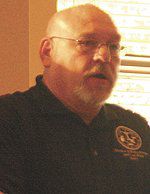The first annual Utah Mine Safety Conference was held at the College of Eastern Utah on Oct. 22. The conference was the first held by the Utah Office of Mine Safety created by recommendation of the Utah Mine Safety Commission which was formed by Gov. Jon Huntsman in August 2007 after the Crandall Canyon Mine accident.
Garth Nielson is the director of the newly formed Office of Coal Mine Safety. He welcomed everyone to the conference and thanked them for their attendance at this inaugural event. Nielson said he enjoys the subject of mining and he has been associated with mining since the age of 19. He has been the director of the Office of Coal Mine Safety for three months now. The objective of the state is mine safety and to address concerns. Sherrie Hayashi is the director of the Utah Labor Commission and she answers directly to the governor. The Office of Coal Mine Safety is housed within the Utah Labor Commission. The focus of the OCMS is on prevention. The OCMS wishes to be proactive in mine safety and help ensure every miner return home safely at the end of their shift.
“We must use our experience and knowledge to prevent accidents. The people here today have vast experience. We must be good leaders and show our support for safety. Every day we lead people into a new environment that no one has been in before; we have a good idea what is there, but every day in mining is different. We need to focus on prevention. Prevention can make our operations safer,” said Nielson.
“Safety is a culture. We can’t rely on luck. Have you ever stopped and thought how many lives you have saved. You are too good at what you do to rely on luck,” said Nielson.
The OCMS is working with MSHA to promote safety. They work with MSHA on any incidents. There have been eight incidents so far this year. “We would feel good to never have to go to any incidents,” said Nielson. Compliance is a focus but also safety and prevention. “We need to hold accountable anyone who doesn’t want safety and doesn’t work safely.
Nielson said his office has worked to create an advisory council and he has visited every mine. During his visits to mines and the communities of the miners, he has realized the individuals are the most important part in mining. The most important thing his office can do is to keep miners safe and make sure that family, friends and neighbors all go home at the end of the day.
Nielson said the conference would address a variety of subjects with nine speakers throughout the day. He introduced Debbie King who works in the Price office of the Utah Labor Commission. King works with miner certification. She gave an introduction to the certifications she works with in her office. “The OCMS is a new office, but certification has been around a long time. There are always a lot of questions on where to get training. The state of Utah certifies for five positions including foreman both underground and surface; fire boss and electrician both underground and surface. King’s office doesn’t do any of the actual training. Trainers at WETC and private companies do the training, her office does the certifications. They also certify for the eight hour refresher course each year and 32 hour new miner certifications.
Records are kept at the state of each person passing any type of certification. Federal certification records are kept at Denver by MSHA. Certifications do expire. If you leave the profession for five years or longer it will expire. You can retest if it expires or is revoked. If an electrician misses their yearly refresher course then they will have to recertify.
King said it is a concern of how to educate and train the next generation of miners and do it so they will do their jobs well and safely. The training consists of two major components both classroom and on the job training. CEU has training programs as well as the Western Energy Training Center and independent miner trainers. CEU offers 15 week training courses for the certifications.
King said it is important that experienced miners pass along their knowledge to incoming miners before they retire. The question of why more miners aren’t passing the certifications was discussed. Sometimes those taking the certifications are unprepared. A better job of preparing miners for these certifications must be done. King said her job is to get the information out to the miners. Their job is to study and prepare for the certifications. The labor commission also has a webpage coming in the future where miners will be able to download a study guide and testing schedules. Also coming soon the miners will be able to check and see when their certifications expire.
Part I: Coal Mine Safety conference

"Garth Nielson is the director of the Office of Coal Mine Safety."
